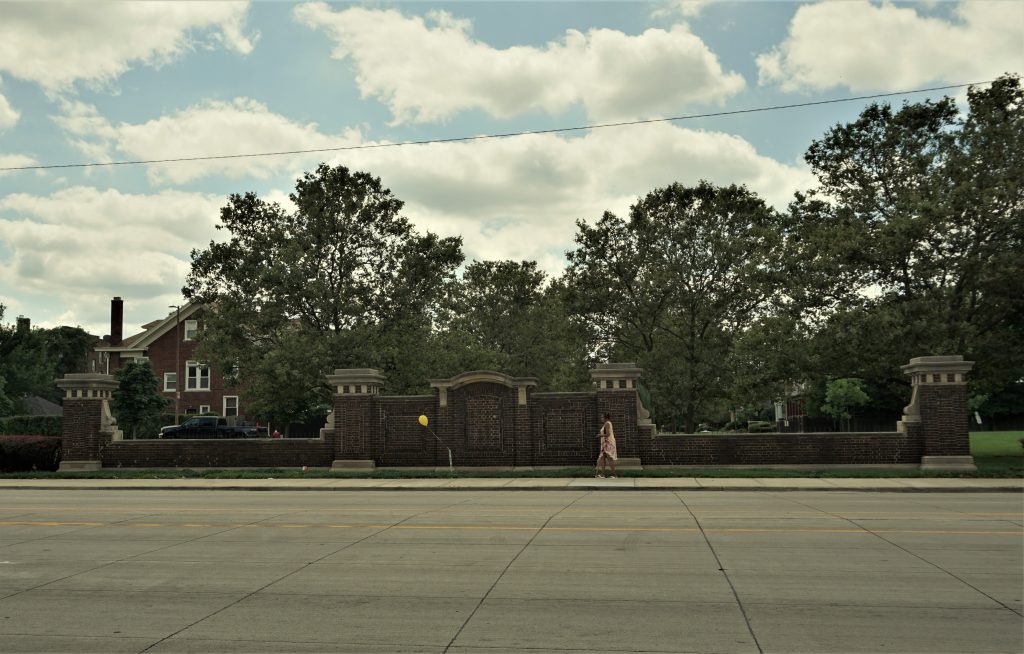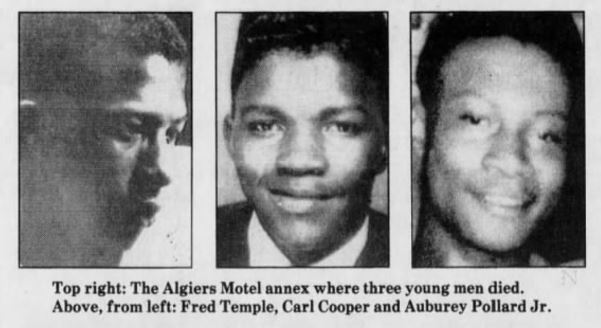Detroit Police Officers Charged in 1967 after Algiers Motel Incident
Dozens of Detroiters died in the civil unrest of July 1967, but 3 death, in particular, gained national attention.

Editor’s note: Heidi Ausgood filed this story for WDET in 2007.
The 1967 Detroit riot left 43 people dead. Of those, three deaths gained national attention. Aubrey Pollard, Carl Cooper, and Fred Temple were shot to death at the Algiers Motel on July 26, three days after the disturbance began at 12th and Clairmount. Pollard was 19. His sister, Thelma, says he might not have died that day if only he had listened to their mother.
“He had come home that Tuesday morning,” she says. “And my mom noticed that he had been in some sort of confrontation. So he explained to her that he had gotten into a confrontation with the police officers at some sort of motel that he was hanging in.”
Support the news you love.
Here at WDET, we strive to make our journalism accessible to everyone. As a non-profit public media institution, we maintain our journalistic integrity through independent support from readers like you. Because you value WDET as your source of news, music, and conversation, please make a gift of support today. Even $5 a month helps!
Thelma Pollard says says Aubrey had been beaten up pretty badly. He had bruises on his face and arms. And his mother warned him not to go back to that motel.
“She said, ‘If they beat you up the night before, they’ll come back tonight and kill you.’” — Thelma Pollard
But Aubrey Pollard did go back. And it cost him his life. Early that Wednesday morning, the Algiers Motel was stormed by three branches of law enforcement: the National Guard, Michigan State Police, and Detroit Police. One state trooper later said the raid was chaotic. The first thing he saw when he entered the motel was a dead body. Other people were lined up against a wall and shots were being fired. He says it was such a confusing scene that his commanding officer ordered his unit to leave. Lee Forsythe was staying at the motel when the police stormed the building. He says he ducked into a room and hollered out to let officers know he was there. What happened next, he says, was terrifying.

“I could see him kicking the door open and firing shots” Forsythe says. “And all of a sudden, he got to me, and he opened the door, and he pointed the shotgun at me, and…it..it just didn’t fire. He was…it didn’t have a shell.”
Forsythe says he was taken out of the room and led down the stairs where he saw the body of 17-year-old Carl Cooper.
“This was my friend, this was my best friend,” Forsythe says. “So I break over to see Carl, and like I was telling you, I heard his last breath.”
Forsythe remembers being lined up against the wall with some other people, taunted and tortured by the police. He says an officer took him inside a room and told him to scream like he was being beaten badly. Forsythe was sent out of the room. Then it was Aubrey Pollard’s turn. He was taken into the room, but he didn’t come out.
“Aubrey was saying, ‘Mister, I’m sorry, I’m sorry,’ because he had broke his rifle hitting Aubrey,” Forsythe says. “And he say, ‘I’m sorry, I’m sorry.’ But…then we heard a boom. And then we didn’t hear Aubrey no more.”
Forsythe says the police came out of the room and whispered to one another before telling everybody to leave. Forsythe says, Fred Temple, 18, asked to go back to his room and get his shoes. Officers told him he could and Temple walked off. It was the last time anyone would see him alive. Forsythe and a friend ran to Carl Cooper’s house to tell his family what happened. That friend would call Aubrey Pollard’s family later. None of the victims’ families would ever hear from the police. And it would be days before a police report was even filed on their deaths. But an investigation was launched. Moments after the shooting, the owner of the Algiers Motel called the home of U.S. Rep. John Conyers. The congressman’s field representative, Arthur Featherstone, answered the phone.
“We received a telephone call the early morning hours of this incident,” Featherstone says. “And Mr. [McUrant] Pye, who was the owner of the Algiers Motel, had indicated to us that his motel had been fired on, had been stormed, and some young people were killed.”
Featherstone says he never believed the story that there were snipers at the Algiers.
“The story that was told to me and Congressman Conyers was that there was some young African-American men in the rooms with some young, white ladies from Ohio,” Featherstone says. “They had been outside to get the supplies they needed for the night – the beer and the cookies and whatever else, potato chips, and they were seen going in the motel, these couples. And I guess they kind of infuriated the police, because they indicated there were some shots were fired from the motel. And Mr. Pye said that was not true, cause there was nobody in the motel that had a gun other than the person on the desk at the motel.”
Featherstone says he hung up the phone and told Conyers what had happened. Featherstone left for the motel. When he got there, activist James Del Rio and state senators Coleman Young and Basil Brown were already there. Featherstone says what they saw literally made them sick to the stomach.
“It looked like something that goes on in Baghdad. Blood, everything shot up, tumbled up, bodies…make you sick. I’m still sick.” — Arthur Featherstone.
Later that afternoon, the Wayne County Prosecutor’s office received a tip. An attorney provided information on two white girls who were at the Algiers Motel that morning. More inquiries were made. And first-degree murder charges were filed against Detroit Police officers Ronald August and Robert Paille. August originally lied about what happened, but would later claim he killed Aubrey Pollard in self-defense. Paille would make statements implicating him in the murders. Those statements were eventually thrown out as inadmissible, because the homicide detectives had failed to read him his rights. The charges against Paille were dropped. No one would ever be charged in the deaths of Carl Cooper and Fred Temple. It was never determined who killed them. The National Guard, state troopers, and Detroit Police gave conflicting statements as to who was at the motel first and who did what. The Ronald August case received so much attention in the black community that defense attorneys filed a motion for a change of venue. The state supreme court appointed Oakland County Circuit Court Judge William Beer to the case. Beer filed a motion to try the case in Mason, Michigan, a town with a mostly white population. The trial lasted nearly six weeks. The jury found Ronald August not guilty. The Algiers Motel Incident helped change the city of Detroit. It galvanized the black community and spearheaded a political activism that would result in the election of Coleman Young as Detroit’s first black mayor in 1973. But this is of little comfort to Thelma Pollard, who sees her brother’s life as a tragic tale of what could have been.
“He was really a gifted artist, and if he had just someone just to believe in him and support him, he could have gone. Could have,” Pollard says.


